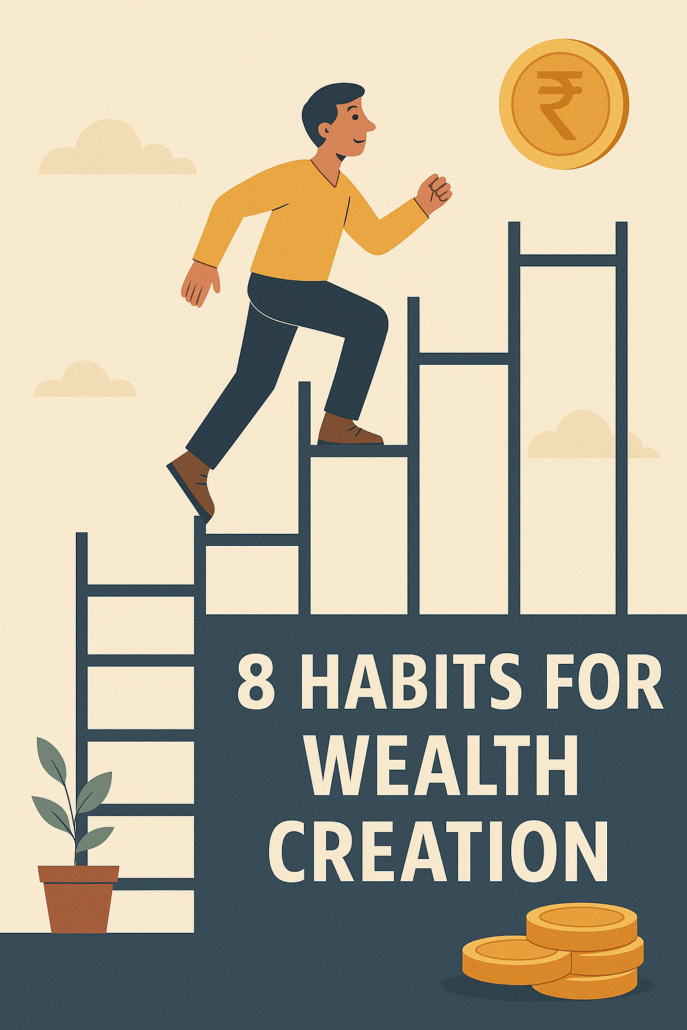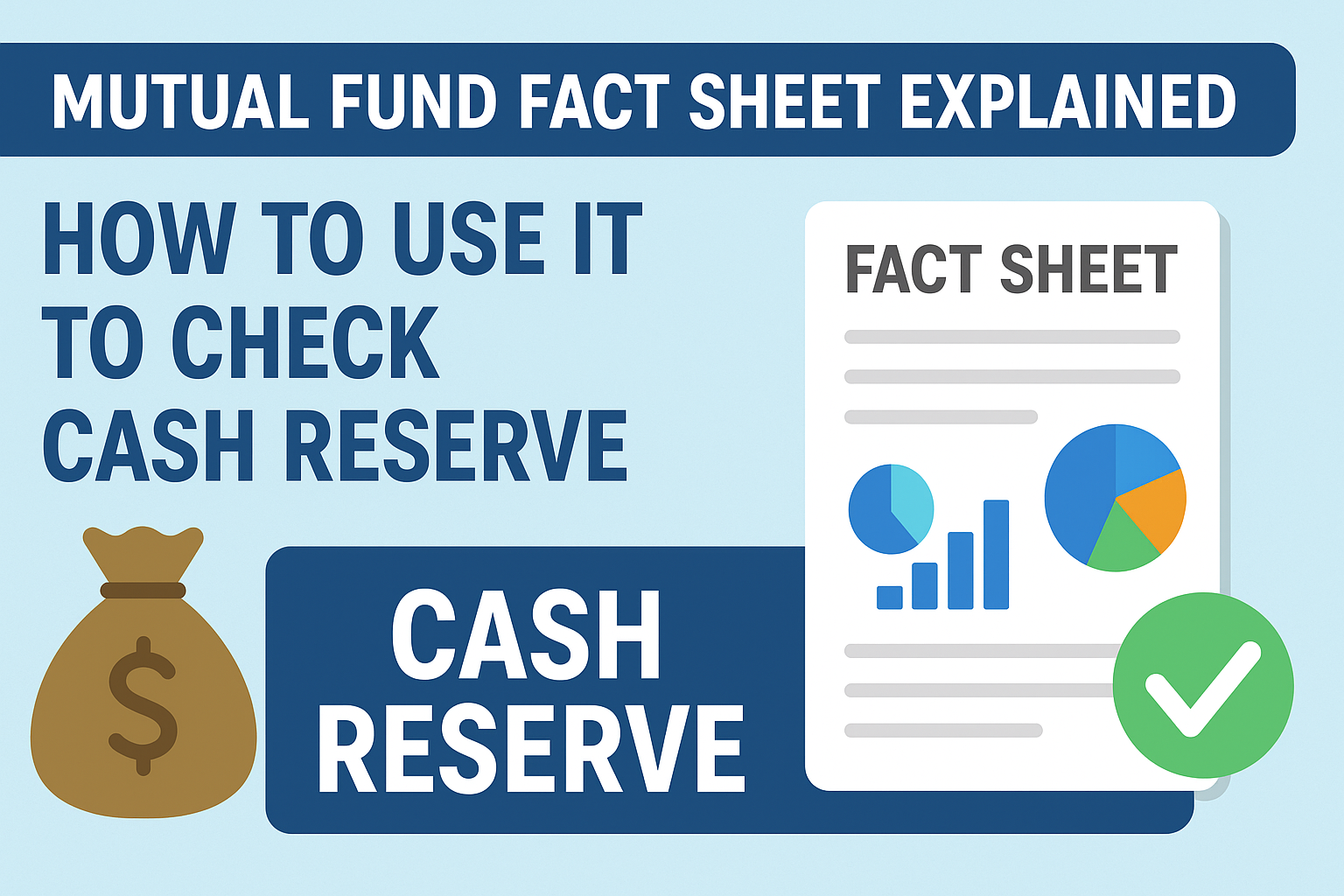Table of Contents
Toggle💸 8 Wealth-Creation Habits That Changed My Life Forever
Introduction: Wealth Is a Habit, Not a Coincidence
We often look at wealthy people and assume they got lucky. Maybe they had rich parents, inherited property, or got an early job in a big company. But if you scratch the surface, you’ll discover a simple truth: wealth isn’t an accident — it’s a result of disciplined daily actions.
These wealth-creation habits aren’t taught in school, and most of us don’t even learn them from our families. In fact, many of us grow up with limiting beliefs about money:
-
“Money doesn’t grow on trees.”
-
“Rich people are greedy.”
-
“It’s wrong to want more money.”
These beliefs quietly sabotage our ability to build wealth — even when we work hard. The good news? You can change your financial future by changing your habits.
This blog isn’t just a list — it’s a practical roadmap. We’ll dive into 8 life-changing wealth-creation habits, backed by real-life insights, examples, and action steps. These are the exact habits that transformed my own mindset and financial health. And they can do the same for you.
Whether you’re a salaried employee, small business owner, or freelancer, these habits apply to anyone who wants to create wealth with purpose.
💡 Wealth-Creation Habit 1: Avoid Lifestyle Inflation
What is Lifestyle Inflation?
As soon as your salary increases, your expenses magically rise with it. New phone. Bigger car. Fancy dinners. Better clothes.
That’s lifestyle inflation — and it kills wealth before it even begins.
Rich people don’t raise their lifestyle every time their income grows. Instead, they raise their investment rate.
📍 Real-life Example
Ravi, a 28-year-old IT professional in Bengaluru, got promoted and started earning ₹20,000 more per month.
Instead of upgrading his flat or getting a new bike, he increased his SIP contribution by ₹15,000.
Fast-forward 10 years — that single habit added over ₹30 lakh to his corpus.
❌ Common Mistake
People confuse self-worth with net worth. Buying flashy items for validation keeps you poor, even if you earn well.
✅ Action Step
When your salary increases, follow the 50-30-20 Rule:
-
50%: Needs
-
30%: Wants
-
20%: Investments
As your income grows, make 20% → 30% or 40%. That’s how wealth-creation habits stack over time.
💡 Wealth-Creation Habit 2: Stay Curious, Stay Humble
Why Curiosity Matters More Than Confidence
Wealthy people never stop learning. They don’t assume they know everything about money. Instead, they stay curious about trends, new tools, financial mistakes, taxation, and more.
They read books, attend workshops, listen to experts — and most importantly, ask questions.
Humility helps them admit what they don’t know — and that’s how they avoid costly financial errors.
“The moment you think you know everything about money… is the moment you start losing it.” — Anonymous Financial Coach
📚 Example of Curiosity in Action
Anita, a homemaker turned investor from Kolkata, started watching financial YouTube videos in Bengali. At first, she didn’t even know what SIP meant.
But instead of feeling intimidated, she kept learning. Within two years, she:
-
Opened her own mutual fund account
-
Started two SIPs
-
Guided her husband to reduce tax outgo using ELSS
Today, Anita manages over ₹12 lakh in investments. Her story was even featured in a financial magazine.
❌ Mistake to Avoid
Many people say, “Finance is boring” or “I’m not from a commerce background.”
That mindset is a trap. Wealth doesn’t care about your degree. It rewards students of money.
🧠 Practical Tips
-
Watch 1 finance video every weekend (start with basics of SIP, inflation, tax-saving)
-
Read one personal finance book every quarter. Start with:
-
The Psychology of Money
-
Rich Dad Poor Dad
-
Let’s Talk Money by Monika Halan (perfect for Indian readers)
-
-
Subscribe to a personal finance newsletter like CashBabu.com to stay updated.
💎 Why This Habit Works
Staying curious helps you:
-
Spot financial scams early
-
Understand your own risk appetite
-
Make smarter decisions in real estate, insurance, and retirement planning
Every step you take in financial learning is a deposit in your wealth-building bank.
💡 Wealth-Creation Habit 3: Don’t Seek Validation
Who Are You Impressing?
Many people spend money just to “look successful” — not to be successful.
They upgrade phones every year, post vacation selfies on EMI, or buy luxury brands just to earn likes or approval.
But rich people think differently.
They don’t seek validation. They seek value.
They’d rather have a healthy portfolio than a heavy watch.
“You can’t impress broke people and build wealth at the same time.”
📉 Real-life Example
Karan, a marketing executive from Mumbai, used to spend nearly 60% of his income on things to “look rich”:
– Branded clothes
– Frequent outings
– A car on EMI
After hitting a financial crisis during the pandemic, he reflected on his choices.
He sold his car, moved into a modest apartment, and started investing ₹10,000 monthly in SIPs.
Now, 4 years later, he has over ₹7.2 lakh invested — and zero stress about how he looks to others.
❌ Common Trap
Social media fuels comparison.
If your spending is driven by trends, you’ll always feel broke — no matter your income.
✅ Actionable Shift
Ask yourself before every expense:
“Is this purchase helping me impress others — or improve myself?”
Practice the 90-Day Rule:
If you want to buy something expensive, wait 90 days. If you still want it and can afford it comfortably — go ahead. If not, invest the money instead.
💬 Final Thought
True wealth is silent. It doesn’t need to scream through shoes, gadgets, or cars.
One of the most powerful wealth-creation habits is learning to value peace over praise.
Now, moving on to Part 4 with Habit 4. Let’s go.
💡 Wealth-Creation Habit 4: Make Investing a Priority, Not an Option
Why Just Saving is Not Enough
Savings are safe — but they don’t grow. Inflation silently kills your idle money.
Wealthy people don’t just save — they invest. It’s not optional for them. It’s a part of their monthly routine, like rent or groceries.
The goal? Make money work harder than you do.
📈 Example: Power of SIP
Let’s say you start a SIP of ₹5,000/month at age 25 in a mutual fund offering ~12% annual return.
| Years | Corpus |
|---|---|
| 10 | ₹11 lakh+ |
| 20 | ₹50 lakh+ |
| 30 | ₹1.76 crore+ |
Now imagine increasing it to ₹10,000/month — your wealth crosses ₹3.5 crore by 55.
That’s the power of prioritizing investing early.
❌ Mistake: “I’ll start when I have more money”
This mindset delays wealth creation by years.
Even a small SIP of ₹1,000 matters more than waiting to invest ₹10,000 later.
✅ Action Plan
-
Start with SIP, PPF, or index funds — they’re beginner-friendly and consistent.
-
Automate your investment. Use auto-debit.
-
Track monthly net worth (not just income).
“Poor people spend first, then invest what’s left.
Rich people invest first, then spend what’s left.”
Next up is Part 5: Habit 5 – Think Long Term.
💡 Wealth-Creation Habit 5: Think Long Term — Always
Get Out of the “Now” Trap
Most people want quick returns. They chase trending stocks, flip crypto coins, or gamble on IPOs.
But wealthy individuals think in decades, not days. They understand that long-term investing is boring but effective.
🌱 Example of Long-Term Success
Sarla Aunty, a retired school teacher in Pune, started investing ₹1,000 in mutual funds in 1999.
Today, her portfolio is worth ₹88 lakh+ — purely because of compounding, consistency, and time.
She never panicked during 2008 or 2020 crashes. She stayed invested.
❌ Common Mistake
People withdraw money at the first sign of market dips — breaking compounding’s power.
This panic reaction destroys long-term wealth.
✅ Mindset Shift
Ask yourself:
-
What will my money look like in 10, 15, 20 years?
-
Will today’s emotional decision affect tomorrow’s financial freedom?
📌 Long-Term Tools
-
Equity mutual funds
-
NPS (National Pension System)
-
Blue-chip stocks
-
Index funds
Discipline > Timing. Patience > Panic.
💡 Wealth-Creation Habit 6: Start Early — Like, Yesterday
Why Starting Early Beats Starting Big
Most people delay investing because they feel they don’t earn enough.
But time beats amount when it comes to wealth creation. The earlier you start, the lesser you need to invest.
“The best time to plant a tree was 20 years ago. The second-best time is today.” – Chinese Proverb
🔍 Real-Life Comparison
Let’s take two friends:
| Name | Starts at Age | SIP per Month | Stops at Age | Total Invested | Corpus at 60 (12% return) |
|---|---|---|---|---|---|
| Ramesh | 25 | ₹5,000 | 60 | ₹21 lakh | ₹2.75 crore |
| Suresh | 35 | ₹10,000 | 60 | ₹30 lakh | ₹1.98 crore |
👉 Despite investing ₹9 lakh more, Suresh ends up with ₹77 lakh less than Ramesh — simply because Ramesh started early.
❌ Excuses to Drop
-
“Let me wait for a better job”
-
“Let me pay off my loans first”
-
“I’ll start after marriage/kids”
These delays cost lakhs in missed compounding.
✅ Quick Start Tips
-
Begin with as little as ₹500–₹1,000 per month
-
Automate it via SIP
-
Increase 10% annually as your salary grows
Early investing is one of the smartest wealth-creation habits you can build in your 20s.
💡 Wealth-Creation Habit 7: Use System 2 Thinking
Emotion vs. Logic in Money
We all fall prey to emotional decisions — panic selling, overbuying insurance, copying friends’ investments.
Nobel Prize-winning psychologist Daniel Kahneman calls it System 1 thinking — fast, automatic, impulsive.
Wealthy people rely on System 2 — slow, logical, deliberate thinking.
“System 2 thinking builds wealth. System 1 burns it.”
📊 Case in Point
During COVID crash (March 2020), the stock market fell over 35%.
Many people sold their SIPs in panic.
But those who stayed calm and continued investing saw huge gains in the recovery. By mid-2021, most funds had recovered and grown over 100%.
❌ How You Lose with Impulses
-
Chasing trending IPOs
-
Buying crypto at its peak
-
Selling mutual funds during dips
✅ How to Apply System 2
-
Sleep on big money decisions
-
Follow a written investment plan
-
Ignore WhatsApp forwards and influencer tips
-
Ask: “What are the long-term consequences?”
Being calm and calculated isn’t boring. It’s smart.
💡 Wealth-Creation Habit 8: Heal Your Relationship With Money
Your Money Story = Your Money Reality
If you believe “money is evil,” or “I don’t deserve to be rich,” — guess what? You’ll subconsciously sabotage your wealth journey.
Rich people treat money as a tool, not a trophy or taboo. They don’t obsess, fear, or worship it.
“How you think about money is how you treat it.”
🧠 Mindset Check-In
-
Do you feel guilty asking for a raise?
-
Do you feel anxious while checking your bank balance?
-
Do you secretly believe wealthy people are dishonest?
These beliefs create emotional blocks to wealth.
✅ How to Heal Your Relationship
-
Journal your money thoughts — positive or negative
-
Reframe beliefs:
-
From: “Money causes problems”
-
To: “Money solves problems”
-
-
Follow people with healthy financial mindsets, not flashy ones
The wealth-creation journey begins inside your head before it shows in your bank account.
👥 Mini Case Study: How One Couple Built ₹1.3 Crore in 10 Years
Meet Sunil and Priya, a middle-class couple from Nagpur. In 2013, they started a combined SIP of ₹10,000/month after reading a finance blog.
Here’s how they applied the 8 habits:
-
Avoided upgrading their lifestyle despite promotions
-
Watched weekly YouTube videos about personal finance
-
Ignored social pressure for buying a car or flat on EMI
-
Invested without fail — even during job loss in 2020
-
Stayed patient during market dips
-
Increased SIP to ₹18,000 by 2022
-
Focused on long-term goals like child’s education and early retirement
Today, in 2025, their portfolio is worth over ₹1.3 crore.
They’re living proof that wealth-creation habits work when practiced consistently.
❓ FAQs on Wealth-Creation Habits
Q1: How do I know which habit to start with?
👉 Begin with Habit 4 (Investing regularly) — it gives visible results. Then work on mindset and learning.
Q2: Is it too late to start if I’m in my 40s or 50s?
Not at all. While early starters get compounding benefits, it’s never too late to:
-
Reduce lifestyle inflation
-
Start SIPs
-
Heal your relationship with money
Q3: Do I need a financial advisor to build wealth?
Not always. Many people succeed by learning through books, blogs, and YouTube.
But if your finances are complex, hiring a certified advisor can help streamline your journey.
Q4: I save, but I don’t invest. Is that okay?
Not really. Saving keeps your money idle.
Investing multiplies your money. Even PPF or a basic mutual fund is better than just saving in a bank.
Q5: What if I start and fail to stay consistent?
Everyone slips sometimes. The key is to restart without guilt.
Just like fitness, wealth-building is a long-term game — not perfection, but consistency.
🧭 Final Thoughts: Wealth is Built Daily, Not Suddenly
If you’ve ever felt confused or stuck about money, know this — you’re not alone. Most people don’t learn about wealth-creation habits until they hit financial walls.
But now you know. And that awareness is power.
Building wealth doesn’t require genius — just discipline.
These 8 wealth-creation habits are free to adopt, but they’re worth crores over time.
So here’s your next step:
✅ Pick 1 habit today.
✅ Practice it for 21 days.
✅ Watch how your confidence — and your wealth — grows.
You’ve got this. Let your wealth story begin — one habit at a time.
![]()



